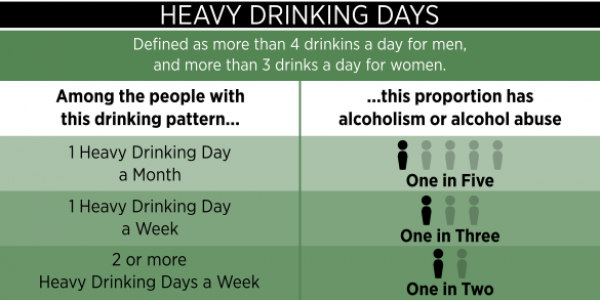What is "High Risk" or Heavy Drinking?

So, how much is too much?
When we really start to think about drinking, we need to know what “too much” actually looks like. Heavy drinking, which is often called “at-risk” drinking, is alcohol consumption that exceeds the recommended daily limits:
For Men: More than 4 standard drinks on any one day, or more than 14 standard drinks in any one week (U.S. Department of Health & Human Services)
For Women: More than 3 standard drinks on any one day, or more than 7 standard drinks in any one week (U.S. Department of Health & Human Services)
What does this actually mean?
If you’re a woman and you drink two medium-sized glasses of wine (8 oz.) every night after work, you’re over the limit before you even reach the weekend.
For men, one night out with friends where you drink three beers and a couple of shots would put you over the daily limit. Do this just twice in one week and you’re probably drinking close to 10 to 14 standard drinks in just two days, depending on the size and strength of the drinks.
It makes a difference both how much you drink in one day, and how often you have a “heavy drinking day,” which is exceeding the limits listed above. Make sense? If so cool. If not, take a look at the chart above.
Exceeding these limits places drinkers at greater risk for a wide variety of concerns, including the following:
- Health problems, including liver and heart disease, several types of cancer, sexual problems, and stroke;
- Psychological concerns, such as depression;
- Injuries;
- Alcohol use disorders.
This is a very general list and does not go into much detail describing the various health, social, and psychological risks associated with high-risk drinking. If you are interested in reading more about the specific kinds of risks and potential health consequences that are related to heavy drinking, please visit the following resource.
Bottom line – the more you drink on any day, and the more heavy drinking days you have over time, the greater the risk. And, not only for alcohol dependency but also for other health and personal problems as well.
Now what?
You might be reading this and wondering about it. Wondering if it really makes sense, or if it's just a bunch of academics throwing facts and figures around to scare you. Or, wondering what this might mean for you. Or, even wondering if this definition of heavy drinking means that you might have a problem. If that thought is bouncing around in your head right now, you might want to make your way to the next article to learn more about what "problem drinking" looks like.
References
U.S. Department of Health & Human Services. National Institute of Health. National Institute on Alcohol Abuse and Alcoholism. Rethinking Drinking: Alcohol & your health. Retrieved from https://www.rethinkingdrinking.niaaa.nih.gov/How-much-is-too-much/Is-your-drinking-pattern-risky/Whats-Low-Risk-Drinking.aspx
Related Articles

Dependency
If you drink too much for too long, you can become dependent, or physically addicted, to alcohol.

Risks to Psychological Health & Appearance
Drinking over the recommended limits can increase the risk to your psychological well-being.

Immediate & Long Term Health Risks
Drinking over the recommended limits can have immediate as well as long term health risks.






